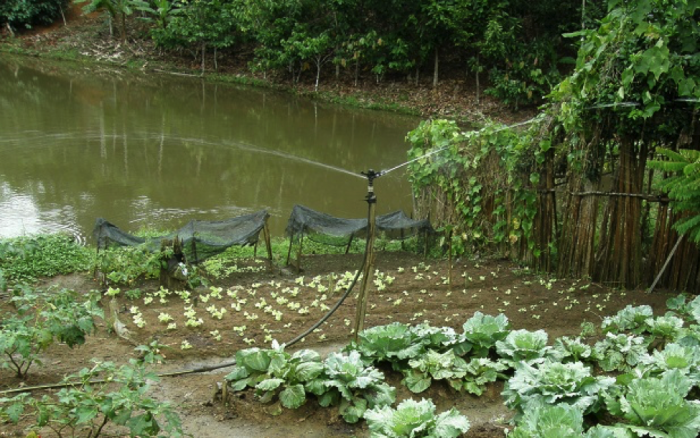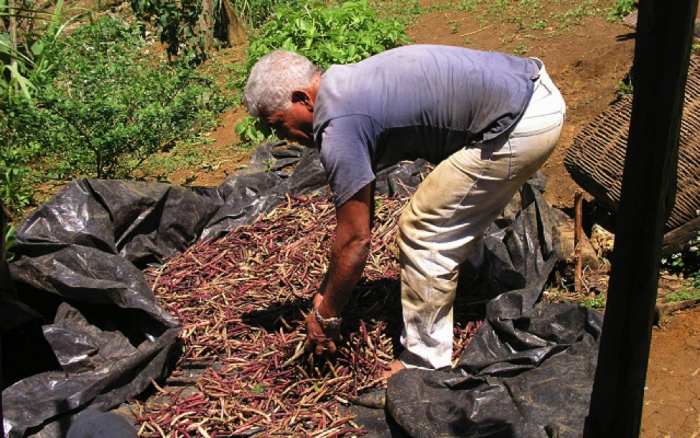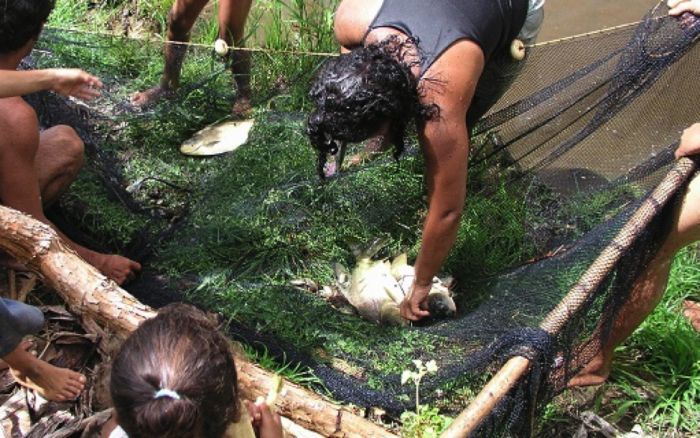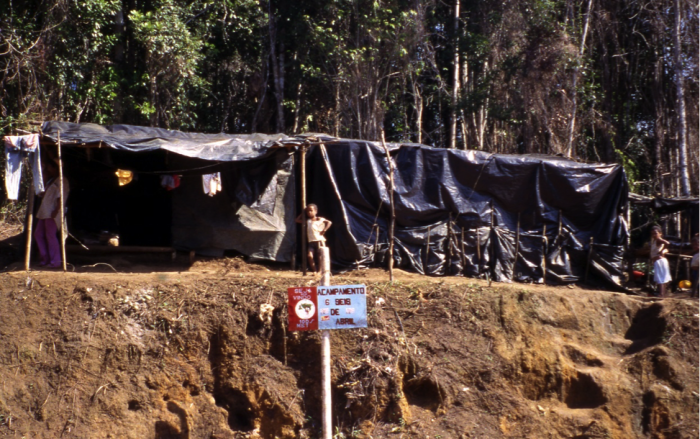Brazil is at a critical juncture. Improvements in social welfare that have been achieved over the past two decades threaten to recede as the Workers’ Party (Partido dos Trabalhadores, PT) is removed from power. Yet the goods that have been objects of Brazil’s various social programs recede and persist in different ways. Once given, some things are harder to take away.
Brazil’s ongoing crisis highlights varying conditions of defeasibility across goods of different kinds, which are consequential for distributive programs and politics. In this post, I examine these issues relative to Brazil’s redistributive land reform programs and draw attention to the resilience that land can provide people when all else seems to fail. I frame these insights in critical conversation with James Ferguson’s (2015) recent book, Give a Man a Fish.
Distributive resilience and defeasibility
Early in September, I made a long phone call to Joana and Damião in Bahia’s cacao region. They are farmers in one of several squatter and land reform communities where I first began conducting research in 2002. We talked at length about recent events in Brazil ranging from the impeachment of President Dilma Rousseff (see also Saad-Filho 2016) and the Zika virus to the threats posed by looming budget cuts.
Damião and Joana told me about the effects the crisis was having on life in the cacao region. Many plantation workers have been laid off, and they wondered if there wouldn’t soon be more land occupations like those in the 1990s (DeVore 2014: 603–644). Joana and Damãio explained, however, that they didn’t feel the effects of the crisis as acutely as others. In the early 1990s, when they still lived from plantations labor, they would have surely felt the squeeze. Since 1997, however, their lives had changed significantly. That year, they joined a dozen families to occupy the forests on an abandoned plantation called Nossa Senhora, which they would spend the next two decades transforming into diversified agroforests (see DeVore forthcoming).
Today, much like the “peasantries” that commanded so much anthropological ink in previous decades, they are smallholding farmers who creatively allocate land and labor in response to crisis. Earlier this year, for example, when the price of beans began to skyrocket, they planted a plot of their own. They haven’t had to buy beans in months.
Joana and Damião benefitted directly from the land rights activism and occupations that swept across Bahia’s cacao lands in the 1990s. Although their squatter settlement was neither affiliated with a specific social movement nor part of a government program, land reform was in the air and they were among its champions. To paraphrase the idea of “autoconstruction” (Holston 1991), theirs was an “auto-agrarian reform” of sorts.
The families who became involved in these land occupations could characterize their years working on the plantations as a life they lived “in the world” (no mundo) and under the authority of plantation managers. Their experiences of life in the world—without being at home there—informed their search for a place where they could live and work, free from control by others. So far as they were concerned, owning a small plot of land was a necessary (if not sufficient) element of a good life, and an important step toward achieving freedom from the plantations.
The independence that Joana and Damião achieved on the land was resilient in the face of layoffs, rising prices, and threats of budget cuts. This highlights varying conditions of resiliency and defeasibility among those goods that have been objects in Brazil’s politics of distribution. This leads to some observations about the durability of goods and distributions that are prompted by James Ferguson’s (2015) recent book, Give a Man a Fish.
Resilience of the lion’s share
Ferguson explores an apparent paradox: while “neoliberal” capitalism reigns, new forms of social protection proliferate. These range from conditional cash transfer programs, like Brazil’s Bolsa Família program (see below), to experiments with unconditional “basic income grant” programs that Ferguson examines in several southern African states. Ferguson’s reflections turn on the proverb: “Give a man a fish, and you feed him for a day. Teach a man to fish, and you feed him for a lifetime.” Ferguson suggests that we reexamine the distributive import of the first clause (“give a man a fish”) to move beyond problems in the productivist logic of the second (“teach a man to fish”).
There are two interrelated points in the background of Ferguson’s argument. The first is the fading specter of “full employment” (2015: 15, 61, 82, 140, 157, 201). Long understood as a condition of possibility for the welfare state, full employment is no longer (or was never) a stable condition in many parts of the world. In a world where the aquaculture industry produces most of the world’s fish, with only a fraction of workers, it makes no sense to teach people how to fish (36). The second point is the “radical deterioration of agrarian livelihoods” (78). Ferguson is concerned with regions where full industrial employment did not follow from the evacuation of the countryside, as had been posited by different theories of capitalist development (192). This gives rise to a contemporary Lumpenproletariat that compels new concerns for distribution.
In this context, Ferguson considers the consequences of reconceiving distribution as a “binding entitlement” (38) that ceases to be conditionally predicated upon work, merit, or “dependent” statuses. This significant shift in the logic of social welfare and distribution develops in tandem with a novel idea of “ownership,” related to what Ferguson calls the “rightful share.” One close analogue to this idea of ownership is the corporate shareholder who, by virtue of being a member of the shareholding group, receives a periodic dividend (51–52). The analogous, but more radical, idea that Ferguson recovers from different sources is the notion that all people are guaranteed a share, not as a return on investment, but by the sheer fact of being in society. This brings an unexpected convergence in claims to “ownership of the means of production” and the “merely ameliorative politics normally associated with social assistance” (168). Unlike the corporate shareholder, however, claimants to a “rightful share” do not appear to claim ownership over productive enterprises, but rather a share in revenue that is collected and distributed by the state (209). The majority may receive their rightful share of fish, but the owners of the ponds still get the lion’s share. The roots of distributive conflict remain.
For a distribution of fishing poles
I suggest, therefore, to open the focus on ownership to a third position that expands the scope of implicated rights. Instead of giving people fish, or teaching them how to fish, give them fishing poles. By this I mean to refer to various material means of production. This move significantly escalates the scope of shareholdership, while advancing growing concerns for effective freedom. With a fishing pole in hand, and place to go fish, people can catch fish themselves. They depend neither on a job at the local aquaculture firm nor upon distributions from the state. This is substantially the situation in which Joana and Damião find themselves.
Ferguson gives less attention to distributions of fishing poles, and real property in land or houses, as this is not what the book is primarily about. One reason for this is the deterioration of agrarian livelihoods, mentioned above, as a condition with which planners have had to “come to terms” against “dreams” of “re-agrarianization” (Ferguson 2015: 78). Ferguson adds that the “decisive political defeat” with which such dreams were met in previous decades made it “only too clear how limited were the possibilities for a rural ‘fix’ to the problems of poverty and unemployment.” This appears as a substantive reason why this particular politics of distribution does not figure into the account.
This is not an idiosyncratic aspect of Ferguson’s thinking. Writing from Brazil, Zander Navarro (2014) has recently suggested that redistributive land reform is not only a dream but more like a pipe dream, which runs against the historical grain (e.g., demographic trends, urbanization, land concentration). Indeed, in regions of Brazil where soybean economies of scale dominate the rural landscape, this particular politics of distribution—the redistribution of land—appears to be entirely off the table.
Distributive distinctions without dogmatism
Facing a perennially uncertain future, rural families in Bahia’s cacao region are not dogmatic purists but rather pragmatic pluralists in their politics of distribution. Only a couple years ago, for example, Damião began to receive his first rural retirement payments, which his family now combines with modest harvests and income from their farm. Multitude and variety are the rule rather than exception in their livelihood. But when push comes to shove, people can and do draw phenomenologically motivated distinctions among goods and combinations of goods (e.g., DeVore 2015: 1208–1211). These distinctions form preferences among goods, which are partially grounded in their conditions of defeasibility.

The multitude and variety of a vegetable garden and fishpond surrounded by agroforest (Photo: Jonathan DeVore, 2009)
Push came to shove in another squatter community at Sapucaia, just across the creek from Nossa Senhora, where another group of families was compelled to choose between distributions of land or food baskets. Their story begins in 1996, about a year before the occupation at Nossa Senhora, when the workers at Sapucaia were handed the figurative keys to the plantation. The absentee owner, who lived in Europe, had never made much of what was supposed to be an investment in natural rubber (DeVore 2014: 204–241), so most of the several-hundred-hectare property remained under forest cover. With the owner’s unceremonious withdrawal, the workers began to live independently on the land, tapping the extant rubber trees for themselves, and hunting in the forest.
By the end of 1997, however, the squatters at Sapucaia were drawn into the surge of land activism that had overtaken the region, which was most visibly led by Brazil’s famous Landless Rural Workers’ Movement, or MST (Movimento dos Trabalhadores Rurais Sem Terra). When the MST arrived, the leaders asked the squatters at Sapucaia for permission to establish a base camp (acampamento) along the road in front of their settlement. From that location, the MST eventually coordinated the occupation of several other plantations.
When the dust settled following these planned occupations, a couple dozen families remained leftover in the MST encampment, as there was no room left on the occupied plantations. Although not part of their original plan, the MST leaders decided that these families would occupy Sapucaia. The squatters there were angry about their involuntary assimilation into the MST, but they had little choice. As one squatter later recalled, however, they eventually accepted the new families, seeing how they “lived with their bags upon their heads, searching for somewhere to go.” Overnight, the number of families living at Sapucaia increased by 400 percent. The extant rubber trees would barely be enough to sustain everyone.
The situation continued until about 2002 when tensions mounted. Unable to make ends meet, many families were forced back into plantation labor. Some others, however, began to clear agricultural plots in the forest, but the MST leadership did not want its members found destroying stretches of Brazil’s Atlantic Forest: a biodiversity hotspot, nearly 90 percent deforested, rich with endemic species, many facing extinction.
The leaders proposed a compromise: the families occupying the forest could remain in the plots they already cleared, but they had to stop further incursions into the forest. This meant that the families at Sapucaia would be unable to cultivate diversified agroforests—like those their neighbors were cultivating at Nossa Senhora—that could offer a reliable and independent livelihood. As compensation for the loss in productive capacity, the leaders proposed to deliver food baskets (cestas básicas) to them into the indefinite future. But the families at Sapucaia were unhappy with these restrictions. Living from promises of food baskets amounted to an undesirable form of dependency, and undermined their project of liberating themselves from their status as “landless” (sem terra) people.
Not long after this episode, the families at Sapucaia severed their ties with the MST and set out to make their own fate. When push came to shove, they chose redistributions of land over distributions of food.
From budget cuts to durable goods
To understand these families’ decision, we can draw a parallel with one of the Workers’ Party’s signature programs, Bolsa Família, which is currently facing two constitutive kinds of defeasibility: budget cuts and roll cuts.
Bolsa Família enrolls some 14 million Brazilian families who receive small cash transfers on a monthly basis. To receive the benefit, parents must ensure that their children attend school and receive regular medical care including vaccinations. As such, the program operates upon what economists call “human capital,” or the knowledge, skills, habits, and dispositions that make people good wage earners. The program has led to undeniable improvements in children’s health and education, and given millions of women greater access to household finances. Brazil’s Gini coefficient dropped significantly between 2001 and 2011, nearly 13 percent of which may be attributable to Bolsa Família (Mendes 2015: 77, 85).
Gregory Duff Morton (2013a) highlights beneficiaries’ fears about both kinds of defeasibility (budget and roll cuts). First, he describes a run on the bank that occurred in 2013 when rumors spread that the government was going to end the program. The current political crisis has renewed similar concerns. Back in May, Dilma Rousseff warned that Bolsa Família could be cut if Michel Temer assumed the presidency; in July, Temer retorted by announcing a 12.5 percent increase in benefits but also suggesting that the program’s rolls would be culled over eligibility issues. These roll cuts—the second form of defeasibility—promise to deepen what Morton calls the “thousand tiny humiliations” (2013a: 926) to which people are subject as their compliance is placed under scrutiny.
The prospect of such cuts highlights what would, and would not, be lost if the program were to end. If the program were cut, children would not suddenly forget how to read or relinquish the benefits that better nutrition provided during early childhood development. But the durability of the program’s effects on distributions of other goods is less clear. Bolsa Família recipients tend to spend large proportions of payments on food (Duarte et al. 2009; Morton 2013b). Because of their size, payments seem to be less often (or easily) converted into durable goods like land—or cattle (see Morton 2013b: 64). This means that budget cuts could have immediate impacts on family nutrition, women’s access to household budgets, and previous achievements in reducing wealth inequality.
The promise to deliver food baskets at Sapucaia was subject to similar failures and losses. As these provisions come from the state, they are subject to impersonal budget cuts. Because families’ access was mediated both by movement leaders and bureaucrats, they could also be subject to analogous roll cuts (e.g., DeVore 2015: 1213). Finally, food baskets are also subject to rising food prices, diversions, and bureaucratic mismanagement. Failures such as these, which inform occasional protests over the delivery of food baskets, do not occur to land that one holds.
Equitable shares
This is not to deny that families at Nossa Senhora and Sapucaia are vulnerable in other ways. Indeed, this is the point: in their distributive politics, they are attentive and responsive to the durability and defeasibility of different goods. Their auto-agrarian reforms, moreover, have enabled them to more definitively exit the world of plantation labor, and to endure layoffs, rising prices, regime change, and other likely cuts to social programs.
They are also oriented by notions of ownership that look beyond rightful shares to the bounty of apples and fish, and toward equitable claims to land, trees, ponds, and other means of life. But perhaps these claims are not so far apart. Ferguson notes that the ideas of ownership he explores find substantial expression in Kant’s moral philosophy (2015: 44, 49, 195), drawing upon Lucy Allais’s (2015) compelling account of beggars. This latter account appears to operate within what Kevin E. Dodson (2003) describes as the “welfare-state liberal” reading of Kant, which sustains a view of “private property” that leaves the lion’s share intact. As Dodson indicates, however, this same tradition offers resources for broader restorative notions of ownership (2003: 530; cf. Allais 2015: 770). This suggests “outlines of a rapprochement” (Dodson 2003: 538) between the concerns of liberalism and socialism, a few things about which might be learned from families like those at Sapucaia and Nossa Senhora.
Jonathan DeVore was a recent Postdoctoral Associate in the Program in Agrarian Studies at Yale University and will be lecturing at the University of Bonn later this fall. He received his PhD from the University of Michigan in 2014 and is currently working on his first book.
References
Allais, Lucy. 2015. What properly belongs to me: Kant on giving to beggars. Journal of Moral Philosophy 12(6): 754–771, doi: 10.1163/17455243-4681042.
DeVore, Jonathan. 2014. Cultivating hope: Struggles for land, equality, and recognition in the cacao lands of southern Bahia, Brazil. PhD diss., University of Michigan, hdl.handle.net/2027.42/109023.
DeVore, Jonathan. 2015. The Landless invading the landless: Participation, coercion, and agrarian social movements in the cacao lands of southern Bahia, Brazil. The Journal of Peasant Studies 42(6): 1201–1223, doi: 10.1080/03066150.2014.990447.
DeVore, Jonathan. Forthcoming. Trees and springs as social property: A Perspective on Degrowth and Redistributive Democracy from a Brazilian Squatter Community. Journal of Political Ecology.
Dodson, Kevin E. 2003. Kant’s socialism: A philosophical reconstruction. Social Theory and Practice 29(4): 525–538, doi: 10.5840/soctheorpract200329429.
Duarte, Gisléia Benini, Breno Sampaio, and Yony Sampaio. 2009. Programa Bolsa Família: Impacto das transferências sobre os gastos com alimentos em famílias rurais. Revista de Economia e Sociologia Rural 47(4): 903–918, doi: 10.1590/S0103-20032009000400005.
Ferguson, James. 2015. Give a man a fish: Reflections on the new politics of distribution. Durham, NC: Duke University Press.
Holston, James. 1991. Autoconstruction in working-class Brazil. Cultural Anthropology 6(4): 447–465, doi: 10.1525/can.1991.6.4.02a00020.
Mendes, Marcos. 2015. Inequality, democracy, and growth in Brazil: A country at the crossroads of economic development. Amsterdam: Elsevier.
Morton, Gregory Duff. 2013a. Protest before the protests: The unheard politics of a welfare panic in Brazil. Anthropological Quarterly 87(3): 925–934, doi: 10.1353/anq.2014.0037.
Morton, Gregory Duff. 2013b. Acesso à permanência: Diferenças econômicas e práticas de gênero em domicílios que recebem bolsa família no sertão Baiano. Política & Trabalho, Revista de Ciências Sociais 38: 43–67.
Navarro, Zander. 2014. Por que não houve (e nunca haverá) reforma agrária no Brasil? In Antônio Márcio Buainain, Eliseu Alves, José Maria da Silveira, and Zander Navarro, eds., O mundo rural no Brasil do século 21: A formação de um novo padrão agrário e agrícola, 697–724. Brasília, DF: Embrapa.
Saad-Filho, Alfredo. 2016. “Overthrowing Dilma Rousseff: It’s class war and their class is winning.” FocaalBlog, 22 March. www.focaalblog.com/2016/03/22/alfredo-saad-filho-overthrowing-rousseff-its-class-and-war-their-class-is-winning.
Cite as: DeVore, Jonathan. 2016. “Reflections on crisis, land, and resilience in Brazil’s politics of distribution.” FocaalBlog, 6 October. www. focaalblog.com/2016/10/06/jonathan-devore-reflections-on-crisis-resilience-and-land-in-brazils-politics-of-distribution.



